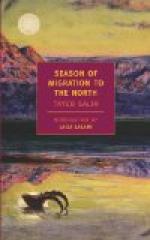[Illustration: Bishop Grouard]
Hours since all the badinage was silenced in the York-boat behind us. On board the Primrose the mate sleeps, and Captain Prothero has the wheel. I creep along the wobbly gunwale to sit out a four hours’ watch with him. “I never saw any one navigate as you do, captain, you seem to have neither chart nor compass.”
“No,” assents he, biting hard on the little black pipe, “we just go by the power o’ man,” and with the words a sharp turn of the wheel lurches us out from the lee of a batture. The jolt jerks up its passengers in the semidetached steerage. A growling of huskies, a kick, and a muttered adjuration in Cree, and all is silent again.
By six o’clock every one is astir, and Saturday is a long glorious day. At noon we stop to take aboard an Indian who hails us from the scrub-pine, sore afraid that he will miss connection with his five dollar treaty present from the Government. It is good to stretch out on the grass after this somewhat restricted Primrose path of dalliance. In front of us extends a long row of islands, in the hot haze suspended midway between blue of lake and blue of sky. Their covering of baby-willows suggests a face guilty of a three days’ beard. We rest, so far as the mosquitoes think it proper we should rest, on a bed of reindeer moss (cladonia rangiferina?), the tripe de roche of the North. This constitutes almost the sole winter-food of the reindeer, its gelatinous or starchy matter giving the nutritive property to the odd-looking stuff. Reindeer-moss has saved the life of many an Indian lost in these woods. We try it, and find the taste slightly pungent and acrid; but when boiled it forms a jelly said to be nourishing and tonic.
No orders are given when we land, and we study countenances and actions to guess the time-limit of our tether. For twenty-four hours we have wondered if there were trout in Lake Athabasca and if they would rise to the fly. With a borrowed rod we take a canoe and off the shadow of a cottonwood point try a cast at random. The gut carries three flies—a brown hackle, a coachman, with a Jock Scott at the tail—a rainbow aggregation. To the coachman we get a rise and it takes three of us to land him. There are no scales; so his weight must forever be unrecorded, but as we lay him out he measures just a trifle over twenty-three inches, as beautiful a lake trout as ever sent thrill up and down a sympathetic spine. Bye-and-bye this road we travel is going to be listed on the sporting routes of the world, and tired souls from the Seven Seas with rod and gun will here find Nepenthe.
[Illustration: The Modern Note-book]
Clutching our catch, we step gingerly along an outstretched oar and climb on board. The orders of the captain to the mate are sporty and suggest turf rather than surf. “Kick her up, Mac!” “Give her a kick ahead!” “Who-o-oa!” On Sunday evening, June 28th, we reach Fond du Lac, clinging close to the water-line on her beautiful stretch of sand. All unregarded are the church-bells, and the Indians crowd to meet us,—bent old crones, strong men, and black-eyed babies. For is not the coming of the treaty party the one event of the Fond du Lac year?




